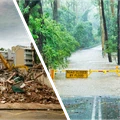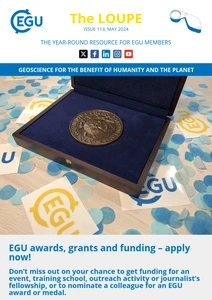President: Heidi Kreibich
(nh@egu.eu)
Deputy President: Nivedita Sairam
(nivedita@gfz-potsdam.de)
The Natural Hazards (NH) Division covers all natural hazards that can produce damage to the environment and to the society. Therefore, it is a place where scientists and researchers of various geosciences disciplines meet with sociologists, economists and people responsible for territorial and urban security and planning policies. The aim is to improve the understanding of the evolution of the processes and to discuss new technologies, methods and strategies to mitigate their disastrous effects. The division is structured in eleven subdivisions as follows: Hydro-Meteorological Hazards, Volcanic Hazards, Landslide and Snow Avalanche Hazards, Earthquake Hazards, Sea and Ocean Hazards, Remote Sensing and Hazards, Wildfire Hazards, Environmental, Biological and Natech Hazards, Natural Hazards and Society, Multi-Hazards and Climate Hazards. Most of the topics that are treated in the NH Division are also treated in other EGU divisions, which is expected due to the intrinsic transversal nature of the NH Division.
The NH Division is one of the historical Divisions of the EGU that was established when EGU was founded and has been and is one of the largest divisions to which many geo-scientists provide steadily contributions of papers and ideas over the years.
As for all EGU Divisions, an Early Career Scientist Award is established also for the NH Division and is given to young researchers who obtain outstanding results in the assessment and mitigation of natural hazard. In addition, the NH Division awards the Plinius Medal that recognises outstanding interdisciplinary natural-hazard research and the Soloviev Medal that recognises outstanding scientific contributions in fundamental research on natural hazards. Both medals are open for all career stages.
Recent awardees

- 2024
- Sergey Soloviev Medal
The 2024 Sergey Soloviev Medal is awarded to
Hayley J. Fowler for her remarkable scientific contributions in fundamental research on climate change impacts on rainfall extremes, and applications on flood risks for the improvement of climate resilience.
Read more

The 2024 Plinius Medal is awarded to
Jacopo Selva for his transformative research in quantitative seismic, volcanic and tsunami hazard modelling, leading to relevant applied solutions used in civil protection and emergency management.
Read more

- 2024
- Division Outstanding Early Career Scientist Award
The 2024 Division Outstanding Early Career Scientist Award is awarded to
Marleen C. de Ruiter for her outstanding scientific work on cascading hazards, multi-risk assessment and management.
Read more

The 2023 Plinius Medal is awarded to
Alberto Viglione for seminal contributions to understanding and assessing hydrological extremes.
Read more

- 2023
- Sergey Soloviev Medal
The 2023 Sergey Soloviev Medal is awarded to
Peng Cui for his high-level career in research and applications on debris flows and other mountain hazards, and his leadership on disaster risk reduction in adherence with the Sendai Framework.
Read more

- 2023
- Division Outstanding Early Career Scientist Award
The 2023 Division Outstanding Early Career Scientist Award is awarded to
Ankit Agarwal for his distinguished work in complexity science for better understanding, quantifying and predicting hydroclimatic extremes.
Read more

- 2023
- Outstanding Student and PhD candidate Presentation (OSPP) Award
The 2023 Outstanding Student and PhD candidate Presentation (OSPP) Award is awarded to
Ambra Hyskaj Naturally Occurring Asbestos in the asbestos-free European Union approach. Is asbestos exposure prevention being understood correctly?
Read more

- 2023
- Outstanding Student and PhD candidate Presentation (OSPP) Award
The 2023 Outstanding Student and PhD candidate Presentation (OSPP) Award is awarded to
Sarah Hồ A Comparison of Agriculture-related Characteristics of Flash and Traditional Drought
Read more

- 2023
- Outstanding Student and PhD candidate Presentation (OSPP) Award
The 2023 Outstanding Student and PhD candidate Presentation (OSPP) Award is awarded to
Yuly Paola Rave Bonilla Numerical modelling of the volcanic emissions dispersion from La Soufrière de Guadeloupe
Read more
Latest posts from the NH blog

Meet the EGU Natural Hazards Division Early Career Scientists representatives
The European Geosciences Union (EGU) Natural Hazards Division is pivotal in supporting the growth of early career researchers, giving them a platform to share their work and ideas, enhancing networking opportunities and contributing to career development. So, are you reading this post and wondering who gives a voice to early career scientists in the Natural Hazards space? The EGU Natural Hazards Division has new Early Career Scientists (ECS) representatives!!! We asked them to talk about themselves, why they became ECS …
Read more

Evolving multi-hazard paradigms in a nutshell
Understanding multi-hazard approaches is crucial in an era of escalating natural hazards leading to disastrous impacts on Earth’s citizens. Triggered by the increasing frequency and severity of these events, this brief post provides a concise yet comprehensive overview of evolving paradigms in multi-hazard research and management. By exploring definitions, historical developments, and current trends, we highlight the critical importance of integrated strategies in mitigating impacts on society all in a nutshell. Foundation: Multi-hazard concept history at one glance It is …
Read more


Ready for EGU24?
Hey there, fellow earth enthusiasts! Are you ready to dive into EGU24? If so, grab your virtual or physical backpacks because we’re about to embark on a journey that’s bound to be as enlightening as it is exhilarating. With its diverse program offering discussions and networking opportunities, EGU24 promises to be an enriching experience. Whether you’re a seasoned participant or a newcomer, preparation is key to maximising your involvement and enjoyment. As a PhD candidate from the Asian continent, I …
Read more
Current issue of the EGU newsletter














